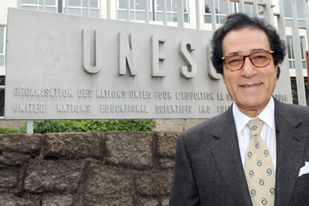Tharwat Ukasha was Egypt’s Minister of Culture during the years between 1958 and 1962, then again in 1969 and 1970. A man of encyclopaedic knowledge, enlightened, and well informed, Dr Ukasha was, by all standards, ahead of his time. He struggled to maintain liberal, enlightened thinking in an era notorious for chaining free thought. What he could not achieve while in office he accomplished on his own after he left office, writing extensively to document Egyptian and world history and art.
As far as I remember, Egypt has had no equal to Dr Ukasha except in the current Culture Minister Farouk Hosny. This goes for their grasp of local and world cultures, awareness and enlightenment, as well as their huge record of achievements on the fronts of promoting progressive thought and reviving heritage.
Mr Hosny successfully worked to renovate full portions of Cairo’s old quarters, walls, gates, and buildings, restoring them to their original splendour. Under his leadership entire districts in Cairo and Alexandria were re-designed and beautified, rescued from the outcome of years upon years of official neglect and unplanned, unchecked expansion, which threatened to obliterate their original character. His accomplishments with Egypt’s historical heritage can only compete with his achievements on the cultural front, where he battled movements of backward and salafi thought.
Mr Hosny’s Egyptian achievements and his grasp of world culture rendered his quest for the top post in UNESCO sufficiently legitimate. Equally legitimate, however, was that he should be the subject of worldwide scrutiny to ensure his fitness to serve the global community in all fairness, with absolute impartiality, never favouring one culture over another.
Understandably, Mr Hosny was taken to account on every stance he adopted or statement he made which betrayed even the slightest bias against some culture, history, State or another. So it was no surprise that his remarks before Egypt’s Parliament in May 2008, in which he expressed an aversion to Hebrew books and Israeli or Jewish culture, should have come to light. I have no doubt Mr Hosny was maliciously lured into making that statement by extremist lobbyists, but his remarks served him ill. He was branded an anti-Semite and his bid for the UNESCO job was jeopardised, bitterly opposed by Jewish activists. But there is no point bringing up that now, since the UNESCO battle has been resolved in favour of the Bulgarian Irina Bokova.
The whole point, and one that has too long been placed on hold, is the deliberate mixing up of matters Jewish and Israeli. Egypt’s official policy towards Israel is itself a case study on that head; it has been marred by bitterness vis-à-vis the Palestinian Israeli conflict. Surpassing all requirements of conflict management, this bitterness has spilled over onto all our official dealings with Israel to make them appear positively schizophrenic.
There is an official over-sensitivity to publicising any peaceful interaction with Israel whether on the trade or experience exchange fronts. News of such activities invariably arouse waves of anger and protest among the grassroots. This is a direct outcome of the current administration policy which does nothing to inform the public of any positive aspect about Israel or its relationship with Egypt, thereby augmenting public bitterness against the Jewish State. It was just that climate which led Mr Hosny to pronounce those remarks that so hurt his bid for UNESCO’s top post, and later to publicly regret having said them.
To make my point I would like to remind readers of a few recent instances. Egyptians only got to know that Jewish synagogues in Egypt have been restored and that a museum for Egyptian Jewish heritage had been established when Mr Hosny disclosed the information before the international community while defending himself against the allegation of anti-Semitism. Egyptians only knew through an argument in Parliament between opposition MPs and former Agriculture Minister Youssef Wali that the government had reformed and cultivated desert lands with the help of Israeli expertise. And again, through another argument with Oil Minister Sameh Fahmy, that Egypt had a long-term agreement to export natural gas to Israel.
When President Obama was asked why he chose to deliver his address to the Islamic World from Cairo last June, he replied that Egypt was a strategic US ally in the region, and that Egypt worked for peace, and had managed to maintain peace with Israel for 30 years now. This particular detail was obscured in the Egyptian media, as though it were some dishonourable sin that warranted concealment.
Most Egyptians have no idea that there is today an Egyptian ambassador in Tel Aviv or that Egyptian Israeli diplomatic relations follow all the venerable diplomatic traditions. Last July a celebration was held at the Egyptian embassy in Tel Aviv to mark the 57th anniversary of the 1952 Revolution in Egypt. State figures in Israel were invited and words were delivered extolling mutual relations and cooperation to justly resolve the Israeli Palestinian conflict.
The movement to ‘disown’ anything and everything Jewish drew the ire of columnist Sayed Abdel-Megid in the Cairo State-owned daily al-Ahram on 14 September. Abdel-Megid heavily criticised the TV drama based on the life of the 20th century beloved diva and film star Laila Murad for unjustifiably obliterating Murad’s Jewish character and focusing on her conversion to Islam. As though she had to disown her original Judaism in order to earn merit on the Egyptian cultural scene.
In view of all these contradictions, I believe it can safely be said that Mr Hosny was a victim not an offender.




